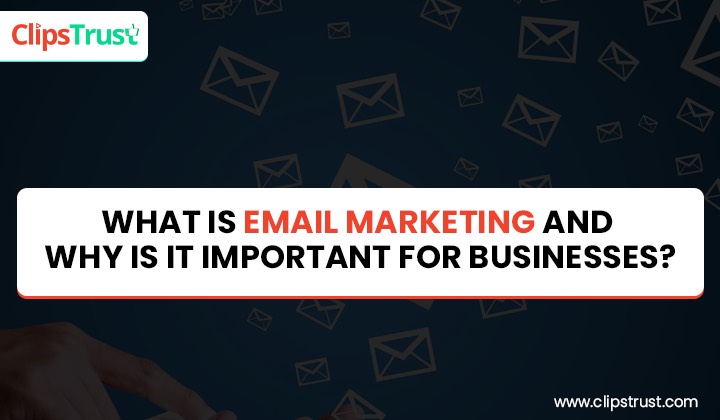What is email marketing? How is it important for businesses to grow in the digital era?
Email marketing is important for small businesses that are looking to connect with their audience effectively. However, in today’s world, email marketing does offer a more direct and effective way to reach out to your targeted audience — especially through widely used platforms like Gmail, which ensures better visibility and engagement.
By opting for the best email marketing strategies, many businesses can nurture relationships with the audience, drive engagement & increase sales. In the following guide, we will understand the benefits of email marketing for business and how one can take their business to the next level with the strategies. Let’s begin!
What is Email Marketing? How Does it Help Businesses?
Email marketing is a strategy followed by the best digital marketing companies in India that involves sending commercial messages to potential and existing customers through email. It is a direct way to connect with an audience, promote your products or services, share your news, and build lasting relationships. To ensure the security and continuity of your email campaigns, especially for businesses using Gmail, it’s wise to explore the best Gmail backup tools that can safeguard important marketing data.
Why is Email Marketing Important For Your Business?
As inbound marketing is important for business, with the help of email marketing, your reach becomes wider. With an email, you can reach as many people as you want, hence ensuring that a wider range of the audience receives your message. Unlike the traditional methods, such as social media accounts & algorithms, it gives you complete control over how & when you must communicate with your audience.
By integrating email marketing into your marketing strategy, you can bring significant benefits. It allows you to build trust & nurture customer relationships, fostering loyalty & brand trust.
Another aspect that makes email marketing crucial for business is its cost-effectiveness, which drives conversions & qualified lead generation.
You can also deliver customised content that resonates with your targeted audience & ones with individual requirements & interests with tailored marketing campaigns.
Read More: How to Use Meta Business Suite For FaceBook & Instagram?
What Types of Emails Are Best for Email Marketing to Engage Customers
There are various types of emails, each with its own purpose. Here are some of the types that help businesses get in touch with their target audience in different ways:
- Welcome email
- Newsletter email
- Promoter email
- Lead Nurturing email
- Transactional email
- Dedicated email
- Email for event invitation
- Survey email
- Re-engagement email
- Seasonal email
- Cart Abandonment Emails
- Milestone email
- Co-marketing of email
Email marketing is used every day to share news by both individuals and companies, market products, and create relationships with customers.
There are 5 main types of email marketing that work well for most needs. The most common types you can use in daily life and business.
Listing the 5 Main Types of Email Marketing Techniques
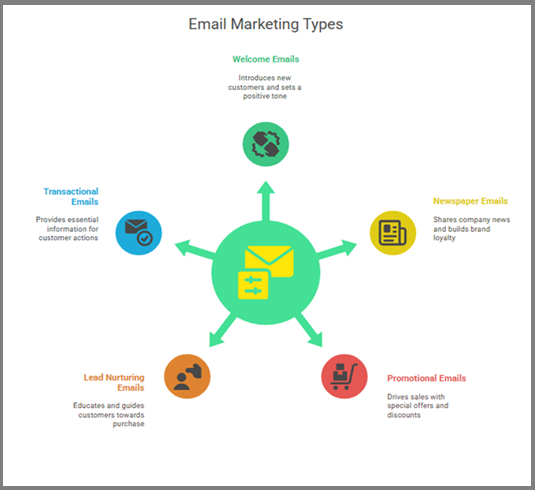
Type 1: Welcome Emails: They are sent to new customers or returning customers to congratulate them and present their brand. They help create a good first impression and may contain a special offer or useful information.
Type 2: Newsletter Emails: Newsletters are regular updates that share the company’s news, tips, or product highlights. They inform the audience and are associated with your brand.
Type 3: Promotional Emails: These items declare special offers, discounts, or new products. Their main goal is to increase sales and attract more customers.
Type 4: Lead Nurturing Emails: Lead-nurturing emails are designed to educate and build relationships with potential and current customers, guiding them toward a purchase.
Type 5: Transactional Emails: These emails are specific to customer actions, such as order confirmations, shipping updates, and password resets.
What Are the Benefits of Email Marketing for Small and Large Businesses?
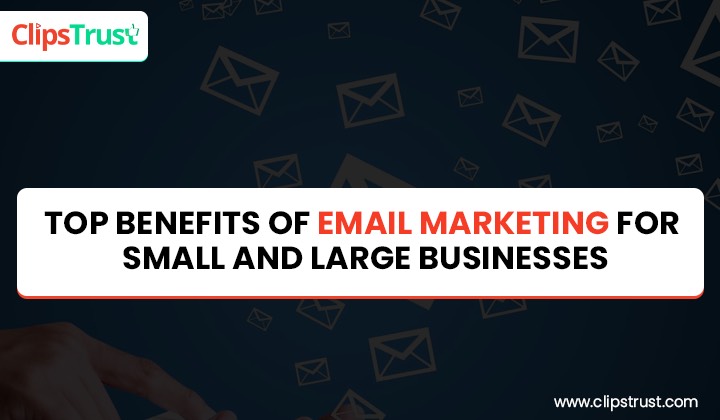
Email marketing does offer a number of benefits for businesses of all sizes, including increased brand awareness, boosted sales, and enhanced customer engagement with a high return on investment (ROI). It is also a cost-effective way to reach out to your target audience & drive traffic to your website.
Benefits of Email Marketing For Small Businesses
Benefit 1: Email marketing is a budget-friendly way to reach out to a large audience, which makes it ideal for small businesses with limited marketing budgets.
Benefit 2: Also, the regular email campaigns might help build brand awareness & strengthen relationships with your customers.
Benefit 3: With the help of this digital marketing concept, you can drive sales by simply promoting products & services, by simply building brand awareness & strengthening your relationships with customers.
Benefit 4: Not only that, but email marketing can help you drive sales by promoting products & services that offer discounts & nurturing leads.
Benefit 5: Including links to your website in emails can significantly increase your traffic & improve your online visibility.
Benefit 6: Customised emails & targeted campaigns can keep your customers engaged & build your relationships.
Merits of Email Marketing Offered to Large Businesses
Merit 1: Email marketing can be scaled up or down to meet the requirements of large businesses, which allows them to reach out to a vast audience.
Merit 2: However, sending customised messages to different groups can improve your campaign effectiveness.
Merit 3: It can also be used to capture leads, nurture them & convert them into your loyal customers.
Merit 4: With the help of email marketing, one can significantly improve one’s customer lifetime value.
Merit 5: Also, businesses can consistently generate a high ROI, which can be beneficial quite beneficial.
Quick Walkthrough of Advantages and Disadvantages of Email Marketing to Businesses of All Types
| Advantages of Email Marketing | Disadvantages of Email Marketing |
| Cost impact: Email marketing is cheaper than traditional ads. | Spam: Email can go to spam if not correct or sent to the wrong people. |
| Wide range: If you access email, you can send emails to people all over the world. | Inbox overload: People get many emails, so you can be ignored. |
| Privatization: Email can fit each individual’s choice of features. | Delivery problems: Some email messages cannot reach people due to spam filters or technical problems. |
| Measurable results: Who opens, clicks, or buys from your email | Unsubscribes: Many irrelevant emails can leave your list. |
| Customer relationship building: Sending useful and relevant email messages helps to build trust and loyalty. | Limited interaction: Email messages do not allow real-time chatting like social media. |
| Data collection: You can gather information about the public from their email reactions. | Outdated lists: Email lists can get old and need regular updating. |
How Email Marketing Drives Customer Engagement and Retention?
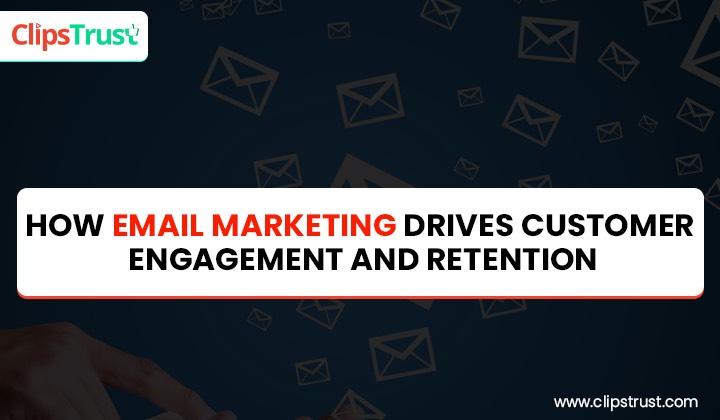
Email marketing can help you significantly drive customer engagement & retention by enabling customised communication, & fostering relationships & delivering timely, relevant content. However, it allows the businesses to maintain regular contact, provide valuable information & even build a sense of loyalty, which leads to increased customer retention.
- Segmentation: The email marketing platforms do permit businesses to segment the audience based on multiple factors such as demographics, purchase history & behaviour. However, this enables the creation of targeted campaigns that resonate with your audience.
- Communication: Businesses can maintain regular communication with customers, as well as fostering a sense of connection & loyalty.
- Personalised Product Recommendations: It allows businesses to suggest products or services based on a customer’s past purchases or browsing history.
- Timely Delivery: Sending out timely updates on order status & shipping information, which keeps customers informed & satisfied. Also, it allows the businesses to announce new products or services to their subscribers, which keeps them up-to-date & interested.
Boosting Sales Through Targeted Email Campaigns
A targeted marketing campaign for business can help boost sales by delivering customised & relevant messages to specific customer segments, which leads to higher engagement, conversion rates & increased revenue.
By simply understanding your audience & their requirements, one can easily craft what resonates with them & drive desired actions, whether it’s a purchase, sign-up or a click through.
Leverage the Campaigns of Email Marketing for Business to Boost Sales & Revenue
- Define Your Targeted Audience: To define your audience, you can group them on the basis of demographics, interests, purchase history, and online behaviour. You can also tailor your messages to address the specific requirements of the customers & all their pain points. Not only that, one can use CRM data & other email marketing tools to segment your list effectively.
- Create Relevant & Personalised Content: The next tip would be to create content around the audience. This includes addressing the user by their name, & tailoring their recommendations based on their user behaviour. Send out emails with discounts & promotions based on an individual’s preference & interest.
- Optimising Email Structure: While crafting an email, always use clear & concise subject lines, which will work as a call to action and coax the users to open up your emails. Always focus on delivering key messages in a clear & easy format. A/B test out different subject lines, email or website designs & usual sending time to maximise your ROI & overall results.
- Automate Your Campagins: You can automate your email workflows based on your customer actions, which include purchase confirmations as well as a welcome sequence. Ensure that your automated campaigns are tailored to specific customer segments for best results.
- Tracking & Analysing Results: Monitor and track open rates, click-through rates, conversion rates, and other relevant metrics to measure the success of your campaigns. Also, you can use your insights to refine your targeting, customisation & content strategies for future campaigns.
By implementing these strategies, you can simply create email campaigns that resonate with your targeted audience, drive engagement & ultimately boost your sales.
How Does Email Marketing Support Other Digital Marketing Channels?

Email marketing supports other digital marketing channels by simply enhancing customer engagement, driving growth & traffic, & improving overall marketing efforts. However, it can be used to promote content, retarget website visitors & customise messaging across different platforms.
As a matter of fact, email marketing supports other digital marketing channels, including content marketing, video marketing, social media, PPC advertising, landing pages & CRM integration. It also helps in driving conversions by promoting sales, offering discounts & recovering the abandoned carts.
The Role of Email Newsletters in Building Brand Loyalty
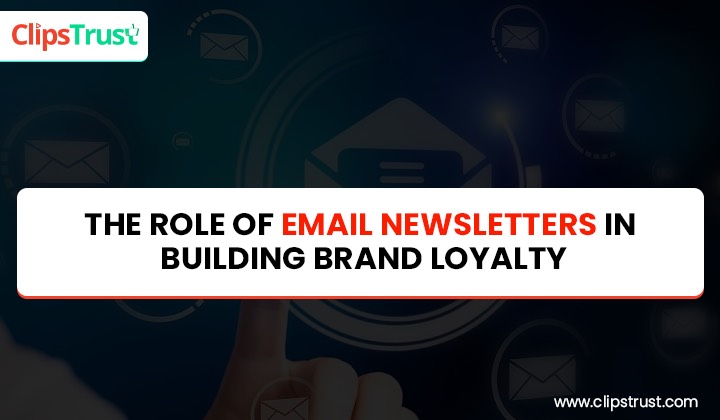
Email newsletters are a robust tool that helps build brand loyalty, foster direct communication, offer valuable content & and provide exclusive perks.
By keeping the subscribers informed, engaged & feeling valued, businesses can cultivate a loyal customer base,
Here’s how email newsletters contribute to brand loyalty & help boost success for business:
1. Building Relationships: With the help of the newsletter, one gets a direct line of communication, which allows all the brands to connect with their audience & build personal relationships. Be it the fashion industry or the IT industry, information about top cryptourrencies or news about new tour and travel packages, customers get a direct communication channel.
2. Providing Value: By providing valuable content, which includes industry news, tips or any exclusive content to keep your subscribers engaged & interested.
3. Exclusivity: To make the subscriber feel at ease & keep them hooked, through exclusive offers, early access to the sales & even email-only promotions.
4. Personalisation: With the help of tailored email content to individual customer preferences, purchase history & even behaviour to curate a customised experience for your subscribers. Companies from different niches such as wedding planners, event management, health care, finance, restaurants, real estate, etc. can personalize emails and send them to their target audience accordingly.
Personalisation in Email Marketing: Why It Matters for Business Growth

Customisation in email marketing is important for business growth because it helps to enhance customer engagement, build even stronger relationships & leads to an even higher conversion rate.
However, by tailoring messages to the individual customer’s preferences, interests, & behaviour & businesses can simply create an even more relevant experience which increases customer loyalty & drives revenue.
Here’s why personalisation in email marketing for business matters:
- Increased Engagement
- Enhanced customer experience
- Improved customer loyalty
- Maximum conversion rates
- Higher ROI
- Better customer relationships
How to Measure the ROI of Email Marketing Campaigns?
To measure the ROI of email marketing campaigns, you might need to calculate the overall return on investment, which is the profit generated from your email campaigns divided by the total cost of the campaign. This usually involves tracking both revenue generated & the expenses associated with your marketing efforts.
Here’s a step-by-step guide to creating marketing campaigns:
Step 1. Calculate the total revenue
Step 2. Calculate the total costs which include subscription fees, extra credits & etc.
Step 3. Calculate your ROI & multiply the overall ROI by 100 to get a specific percentage.
Step 4. Analyse & track down the key metrics such as: open rates, click-through rates, conversion rates, bounce rates, list growth rates, subscription rate, forward & sharing rates.
Step 5. Use the in-built tools to track down the key metrics such as Google Analytics, ROI calculators & etc.
Best Practices for Successful Email Marketing Strategies
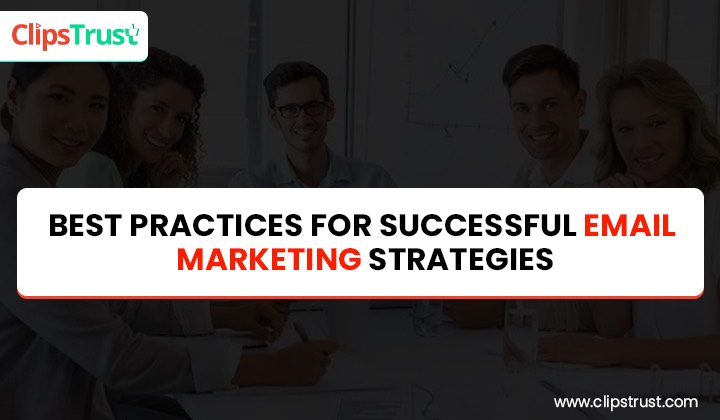
Successful email marketing for a business relies heavily on the best strategies. The key strategies include:
Practice 1: Segmentation
By dividing your audience into smaller groups based on demographics, interests & purchase history to deliver more targeted & relevant content.
Practice 2: A/B Testing
You can experiment with different subject lines, content, and CTAS to optimise your emails for higher open & click-through rates.
Practice 3: Mobile Optimization
Ensure that all of your emails render correctly & are quite easy to read on various devices, especially mobile phones, making it an important part for email as well as mobile marketing.
Practice 4: Accessibility
Make sure that your emails are accessible for everyone, including those with disabilities & by opting for proper alt texts for images.
Practicee 5: Clean Email List
Update your email list & remove any invalid email addresses to maintain a healthy list & improve your deliverability.
Concluding Thoughts on What is Email Marketing & How it Helps Businesses
To conclude, we have explained how email marketing can help your business. In the following guide, we have included the best strategies & tips to maximise ROI on your campaigns and elevate your small business to the next level. Henceforth, we hope that you find this article informative & helpful for your business.
FAQs
Q1. What is business email marketing?
Email marketing is a direct way for companies to contact people through their inboxes. It is used to share updates, market products, and create strong customer relationships.
Q2. How does email marketing work?
This includes sending promotional emails to both new and existing customers. The goal is to drive engagement, promote sales, and build brand loyalty.
Q3. How to get started with email marketing?
Start by setting clear goals and selecting a reliable email service provider (ESP). Then make your email list and craft email campaigns.
Q4. How can I make money through email marketing?
Yes, you can make money with this marketing strategy by directly selling products and services, promoting affiliate products, creating paid newsletters or courses, and aslo selling your digital products and making good revenue.
About The Author
